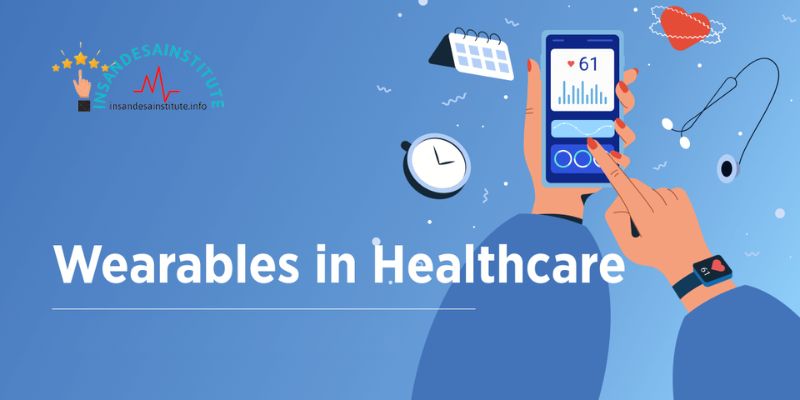In the fast-paced, technology-driven world we inhabit, health-conscious individuals are increasingly turning to wearable technology to monitor and enhance their well-being. The health benefits of wearable technology are manifold, offering a comprehensive approach to tracking and improving various aspects of our physical and mental health. From activity tracking to stress management, these devices have become integral tools in promoting healthier lifestyles.
Activity Tracking for Improved Fitness
One of the primary health benefits of wearable technology lies in its ability to track daily activities. Wearable devices, often in the form of fitness trackers or smartwatches, keep a meticulous record of steps taken, distance covered, and calories burned throughout the day. The real-time feedback provided by these devices serves as a motivational tool, encouraging users to meet daily activity goals and maintain an active lifestyle. This consistent activity tracking contributes to improved cardiovascular health and efficient weight management.
Wearable technology acts as a personal fitness coach, allowing individuals to set and monitor their exercise routines. The continuous monitoring of physical activity helps users make informed decisions about their fitness goals, fostering a sense of accountability and empowerment.

Heart Rate Monitoring: A Window into Cardiovascular Health
A central feature of many wearable devices is the ability to monitor heart rate continuously. This functionality provides users with valuable insights into their cardiovascular health. By tracking heart rate during various activities and at rest, individuals can gauge their fitness levels and identify potential irregularities.
Regular heart rate monitoring is particularly beneficial for those engaged in fitness training. It enables users to optimize their workout intensity, ensuring that they stay within their target heart rate zones for optimal cardiovascular benefits. Moreover, recognizing abnormal heart rate patterns may prompt individuals to seek medical attention, potentially preventing serious health issues.
Insights into Sleep Patterns for Optimal Well-being
Quality sleep is a cornerstone of good health, and wearables equipped with sleep tracking features aim to enhance our understanding of sleep patterns. These devices monitor the duration and quality of sleep, providing users with detailed insights into their nighttime habits.
The health benefits of wearable technology extend to sleep hygiene, as users can analyze their sleep data to identify patterns and make adjustments. Armed with knowledge about their sleep quality, individuals can adopt healthier sleep habits, leading to improved overall well-being.

Stress Management: Nurturing Mental Health
Recognizing the importance of mental health, many wearables now include stress tracking features. These features analyze physiological indicators, such as heart rate variability, to assess stress levels throughout the day. By becoming more aware of their stress patterns, users can take proactive steps to manage stress effectively.
The health benefits of wearable technology in stress management extend beyond mere awareness. Wearables often offer guided relaxation exercises and mindfulness practices, empowering users to take control of their mental well-being. In a world filled with constant stimuli, these tools become invaluable in promoting emotional resilience and overall mental health.
Physical Performance Optimization for Athletes
For athletes and fitness enthusiasts, wearable technology serves as a key tool in optimizing physical performance. These devices track performance metrics such as pace, distance, and workout intensity, providing real-time feedback during training sessions. Analyzing this data allows individuals to tailor their workouts for maximum efficiency and helps prevent overtraining and potential injuries.
The health benefits of wearable technology for athletes are not limited to performance optimization. Wearables contribute to a holistic approach to fitness, offering insights into recovery periods and highlighting the importance of rest in achieving peak physical condition.
Holistic Health Monitoring Beyond Activity
While activity tracking is a prominent feature, many wearable devices go beyond the basics to offer comprehensive health monitoring. Blood pressure, blood oxygen levels, and electrocardiogram (ECG) readings are among the health metrics that wearables can track. This expanded capability allows for a more thorough understanding of one’s health.
Health-conscious individuals can use wearable technology as a proactive tool for early detection of potential health issues. By regularly monitoring vital signs and other health metrics, users can identify deviations from normal ranges, prompting timely medical consultation and intervention. This early detection can be critical in managing chronic conditions and preventing the progression of health issues.
Medication Adherence: A Pillar of Chronic Disease Management
Chronic conditions often require consistent medication adherence, and wearable technology steps in as a reliable reminder system. Some wearables include medication tracking features, sending reminders to users to take their medications as prescribed. This functionality is particularly beneficial for individuals managing conditions such as diabetes, hypertension, or cardiovascular disease.
Improved medication adherence, facilitated by wearable technology, contributes to better health outcomes. By ensuring that individuals take their medications consistently, wearables play a vital role in managing chronic diseases and preventing complications.
Posture Correction for Musculoskeletal Health
The impact of wearable technology on health extends to musculoskeletal well-being through posture correction features. Many people spend extended periods sitting at desks or using electronic devices, leading to poor posture and potential musculoskeletal issues. Wearables equipped with posture monitoring can provide real-time feedback, reminding users to maintain proper alignment.
Maintaining good posture is crucial for preventing musculoskeletal problems, including back and neck pain. Wearables act as personal posture coaches, promoting habits that reduce the risk of chronic pain and discomfort associated with poor posture.

Remote Health Monitoring: Bridging Gaps in Healthcare
Wearable technology has emerged as a powerful tool for remote health monitoring, bridging gaps in healthcare accessibility. Patients with chronic conditions or those recovering from medical procedures can benefit from continuous monitoring of vital signs and health metrics. This data is transmitted in real-time to healthcare providers, enabling timely intervention and reducing the need for frequent in-person visits.
Remote health monitoring enhances patient care by facilitating early detection of potential issues, allowing healthcare professionals to adjust treatment plans promptly. This proactive approach to healthcare contributes to improved outcomes and a more patient-centric model of care.
Behavioral Insights: Personalized Health Recommendations
The wealth of data collected by wearable devices over time provides valuable insights into users’ health behaviors and patterns. Analyzing this data allows for the generation of personalized health recommendations. Wearables can offer tailored advice on physical activity, sleep hygiene, and stress management based on individual habits and preferences.
The health benefits of wearable technology are amplified when users leverage these personalized insights to make informed lifestyle choices. By aligning recommendations with individual needs, wearables become powerful tools for behavior change, promoting sustained improvements in overall health and well-being.
Health Benefits of Wearable Technology for Healthier Lifestyles
In essence, the health benefits of wearable technology lie in its ability to empower individuals to take charge of their health. From tracking daily activities and monitoring vital signs to offering personalized recommendations, wearables provide a holistic approach to well-being. These devices not only foster awareness but also encourage positive behavior change, ultimately contributing to a healthier and more fulfilling life.
As wearable technology continues to evolve, the integration of advanced sensors and artificial intelligence holds the promise of even more sophisticated health monitoring capabilities. The future of wearable technology in healthcare is poised to further revolutionize how we approach health and well-being, making proactive and personalized care accessible to individuals around the globe. Embracing these technological advancements, Insandesainstitute embark on a journey towards a future where wearable technology becomes an indispensable companion on the path to optimal health.



